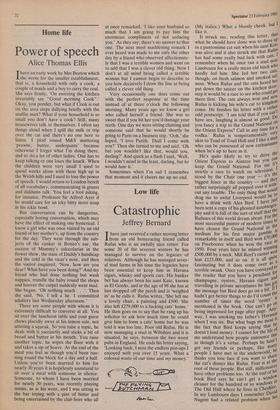Home life
Power of speech
Alice Thomas Ellis
Ihave an early work by Mrs Beeton which she wrote for the smaller establishment; that is, a household with only a cook, a couple of maids and a boy to carry the coal. She says firmly, 'On entering the kitchen invariably say "Good morning Cook".' Okay, you ponder, but what if Cook is out on the area steps dallying briefly with the muffin man? What if your household is so small you don't have a cook? Still, many housewives talk to themselves. I often say things aloud when I spill the milk or trip over the cat and there's no one here to listen. I plod round M&S muttering `prawns, butter, underpants' because otherwise I forget what I'm doing there, and so do a lot of other ladies. One has to keep talking or one loses the knack. When the children were very small I used to spend weeks alone with them high up in the Welsh hills and I used to lose the power of speech. I would return to London bereft of all vocabulary, communicating in grunts and diddums talk. You feel a fool asking, for instance, Professor Sir Alfred Ayer if he would care for an icky bitty more soup in his ickle bowl.
But conversation can be dangerous, especially boring conversation, which may have the effect of making one hysterical. I know a girl who was once visited by an old friend of her mother's, up from the country for the day. They went through the sub- jects of the canker in Bonzo's ear, the success of Mummy's calceolarias in the flower show, the state of Daddy's handicap and the cold in the vicar's nose, and then the visitor enquired, 'Now, how are you dear? What have you been doing?' And my friend who had done nothing but wash nappies, trundle the baby round the shops and hoover the carpet suddenly went mad. She began, 'Oh nothing much . . .'. Then she said, 'No, I tell a lie. I committed adultery last Wednesday afternoon.'
There are some people with whom it is extremely difficult to converse at all. You sit over the luncheon table and your guest chews placidly away at his lemon sole, not uttering a squeak. So you raise a topic, he deals with it succinctly and sticks a bit of bread and butter in his mouth. You raise another topic, he wipes the floor with it and takes a sip of Soave. At the end of the meal you feel as though you'd been run- ning round the block for a day and a half. Unless you've been married to him for nearly 30 years it is hopelessly unnatural to sit over a meal with someone in silence. Someone, to whom I have been married for nearly 30 years, was recently playing tennis, as is his wont, and I was sitting in the bar toying with a pint of bitter and being entertained by the club bore who all at once remarked, 'I like your husband so much that I am going to pay him the enormous compliment of not seducing you.' As they say, there's no answer to that one. The next most maddening remark I ever heard was made to me only the other day by a friend who observed affectionate- ly that I was a terrible women and went on to add that I was a clever old thing. Now I don't at all mind being called a terrible woman but I cannot begin to describe to you how decisively I draw the line at being called a clever old thing.
Very occasionally one does come out with the perfect response at the time instead of at three o'clock the following morning. Many years ago we knew a girl who called herself a friend. She was so sweet that if you bit her you'd damage your teeth. One day we were sitting chatting and someone said that he would shortly be going to Paris on a business trip. 'Ooh,' she lisped, 'I love Parith. Thal! I come with you?' Then she turned to me and said, 'Oh but you wouldn't like that, would you, darling?' And quick as a flash I said, 'Well, I wouldn't mind in the least, darling, but he would hate it.'
Sometimes when I'm sad I remember that moment and it cheers me up no end.










































 Previous page
Previous page